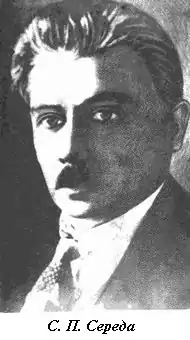Semyon Sereda
Semyon Pafnutyevich Sereda (Russian: Семён Пафнутьевич Середа; 1 February 1871 – 21 May 1933) was a Russian Bolshevik revolutionary and Soviet politician.

He was the son of a railway employee. From 1896 to 1917 he worked as a statistician. Sereda joined the Bolshevik wing of the Russian Social Democratic Labor Party in 1903.
In 1917, he became a member of the Ryazan gubkom, and from 1 March 1918 until 1 December 1921 served as the Peoples's Commissar for Agriculture.[1] In this capacity he led the grain requisition and punitive operations against peasants in Yeletsky Uyezd of Oryol Governorate in 1918.[2] Sereda was one of the main initiators of the creation of state farms and industrial communities.
From January 1920 he was a member of the Presidium of Supreme Soviet of the National Economy and Gosplan. In 1927 he became Deputy Governor of the Central Statistical Office, USSR.[3]
References
- "Semyon Sereda, Russian Bolshevik politician, People's Commissar for Agriculture in Soviet Russia from 1918 to 1921". Look and Learn History Picture Library. Look and Learn. Retrieved 16 May 2018.
- Gorshkov, Boris B. (2018). Peasants in Russia from Serfdom to Stalin: Accommodation, Survival, Resistance. Bloomsbury Publishing. ISBN 9781474254830. Retrieved 16 May 2018.
- "Sereda Semen Pafnutevich - to ... Co Sereda Semen Pafnutevich? 2018". Sereda Semen Pafnutevich - to ... Co Sereda Semen Pafnutevich? 2018 (in Czech). Retrieved 16 May 2018.